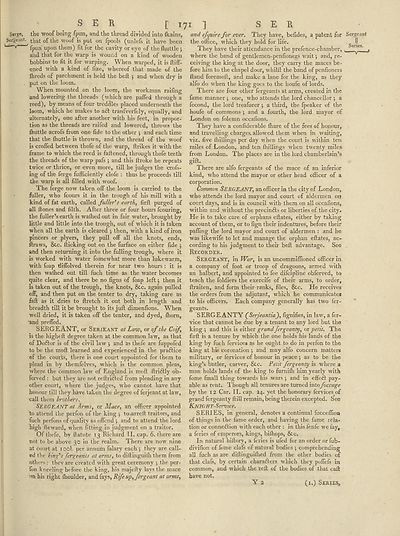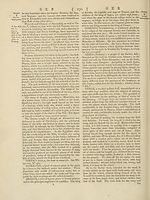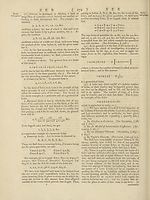Encyclopaedia Britannica, or, a Dictionary of arts, sciences, and miscellaneous literature : enlarged and improved. Illustrated with nearly six hundred engravings > Volume 19, Scripture-SUG
(181) Page 171
Download files
Complete book:
Individual page:
Thumbnail gallery: Grid view | List view

SEE [171] SEE
Serge, the woof being fpun, and the thread divided into Ikains,
Sergeant. tjiat 0f tlie Vvoof is put on fpools (unlefs it have been
fpun upon them) fit for the cavity or eye of the {buttle j
and that for the warp is wound on a kind of wooden
bobbins to fit it for warping. When warped, it is ftiflf-
ened with a kind of fize, whereof that made of the
fhreds of parchment is held the bell j and when dry is
put on the loom.
When mounted on the loom, the workman railing
and lowering the threads (which are palled through a
reed), by means of four treddles placed underneath the
loom, which he makes to aft tranfverfely, equally, and
alternately, one after another with his feet, in propor¬
tion as the threads are raifed and lowered, throws the
Ihuttle acrofs from one fide to the other j and each time
that the Ihuttle is thrown, and the thread of the woof
is croffed between thofe of the warp, llrikes it with the
frame to which the reed is fattened, through thofe teeth
the threads of the warp pafs ; and this ftroke he repeats
twice or thrice, or even more, till he judges the crofs-
ing of the ferge fufficiently clofe : thus he proceeds till
the warp is all filled with woof.
The ferge now taken off the loom is carried to the
fuller, who fcours it in the trough of his mill with a
kind of fat earth, called fuller's earth, firlt purged of
all Hones and filth. After three or four hours fcouring,
the fuller’s earth is walhed out in fair water, brought by
little and little into the trough, out of which it is taken
when all the earth is cleared \ then, with a kind of iron
pincers or plyers, they pull off all the knots, ends,
flraws, &c. flicking out on the furface on either fide j
and then returning it into the fulling trough, where it
is worked with water fomewhat more than lukewarm,
with foap diffolved therein for hear two hours : it is
then walhed out till fuch time as the water becomes
quite clear, and there be no figns of foap left; then it
is taken out of the trough, the knots, &c. again pulled
off, and then put on the tenter to dry, taking care as
faff as it dries to ftretch it out both in length and
breadth till it be brought to its juft dimenfions. When
well dried, it is taken off the tenter, and dyed, Ihorn,
•and preffed.
SERGEANT, or Serjeant at Law, or of the Coif
is the higheft degree taken at the common law, as that
of Doftor is of the civil law ; and as thefe are fuppofed
to be the moft learned and experienced in the praftice
of the courts, there is one court appointed for them to
plead in by themfelves, which is the common pleas,
where the common law of England is moft ftriftly ob-
ferved : but they are not reftrifted from pleading in any
other court, where the judges, who cannot have that
honour till they have taken the degree of ferjeant at law’,
call them brothers.
SERGEANT at Arms, or Mace, an officer appointed
to attend the perfon of the king ; to-arreft traitors, and
fuch perfons of quality as offend ; and to attend the lord
high fteward, when fitting in judgment on a traitor.
Of thefe, by ftatute 13 Richard II. cap. 6. there are
not to be above 30 in the realm. There are now nine
at court at tool, per annum falary each ; they are call¬
ed the kinfs ferqeants at amis, to diftinguilh them from
others : they are created with great ceremony ", the per¬
fon kneeling before the king, his majefty lays the mace
on his right Ihoulder, and fays, Rifeup,fergeant at arms.
and efquire for ever. They have, befides, a patent for Sergeant
the office, which they hold for life. ^ 0
They have their attendance in the prefence-chamber, ,
where the band of gentlemen-penfioners wait j and, re¬
ceiving the king at the door, they carry the maces be¬
fore him to the chapel door, whilft the band of penfioners
Hand foremoft, and make a lane for the king, as they
alfo do when the king goes to the houfe of lords.
There are four other fergeants at arms, created in the
fame manner ; one, who attends the lord chancellor ", a
fecond, the lord treafurer 5 a third, the fpeaker of the
houfe of commons ; and a fourth, the lord mayor of
London on folemn occafions.
They have a confiderable lhare of the fees of honour,
and travelling charges, allowed them when in waiting,
viz. five Ihillings per day when the court is within ten
miles of London, and ten Ihillirgs when twenty miles
from London. The places are in the lord chamberlain’s
gift;
There are alfo fergeants of the mace of an inferior
kind, who attend the mayor or other head officer of a
corporation.
Common SERGEANT, an officer in the city of London,
who attends the lord mayor and court of aldermen on
court days, and is in council with them on all occafions,
within and without the precinfts or liberties of the city.
He is to take care of orphans eftates, either by taking
account of them, or to fign their indentures, before their
palling the lord mayor and court of aldermen : and he
was likewife to let and manage the orphan eftates, ac¬
cording to his judgment to their bell advantage. See
Recorder.
Sergeant, in War, is an uncommiflioned officer in
a company of foot or troop of dragoons, armed with
an halbert, and appointed to fee difcipline obferved, to
teach the foldiers the exercife of their arms, to order,
ftraiten, and form their ranks, files, &c. He receives
the orders from the adjutant, which he communicates
to his officers. Each company generally has two fer¬
geants.
SERGEANTY (Serjeantia), fignifies, in law, a fer-
vice that cannot be due by a tenant to any lord but the
king ; and this is either grand fergeanty, or petit. The
firft is a tenure by which the one holds his lands of the
king by fuch fervices as he ought to do in perfon to the
king at his coronation *, and may alfo concern matters
military, or fervices of honour in peace ", as to be the
king’s butler, carver, &c. Petit fergeanty is where a
man holds lands of the king to furnilh him yearly with
fome fmall thing towards his wars 5 and in effeft pay¬
able as rent. Though all tenures are turned into foccage
by the 12 Car. II. cap. 34. yet the honorary fervices of
grand fergeanty ftill remain, being therein excepted. See
KNIGHT-Service.
SERIES, in general, denotes a continual fucceffion
of things in the fame order, and having the fame rela¬
tion or conneftion with each other : in this fenfe we fay,
a feries of emperors, kings, bilhops, &c.
In natural hiftory, a feries is ufed for an order or fub-
divifion of fome clafs of natural bodies •, comprehending
all fuch as are diftinguilhed from the other bodies of
that clafs, by certain charafters which they poffefs in
common, and which the reft of the bodies of that call
have not.
Y 2 (i„) Series,,
Serge, the woof being fpun, and the thread divided into Ikains,
Sergeant. tjiat 0f tlie Vvoof is put on fpools (unlefs it have been
fpun upon them) fit for the cavity or eye of the {buttle j
and that for the warp is wound on a kind of wooden
bobbins to fit it for warping. When warped, it is ftiflf-
ened with a kind of fize, whereof that made of the
fhreds of parchment is held the bell j and when dry is
put on the loom.
When mounted on the loom, the workman railing
and lowering the threads (which are palled through a
reed), by means of four treddles placed underneath the
loom, which he makes to aft tranfverfely, equally, and
alternately, one after another with his feet, in propor¬
tion as the threads are raifed and lowered, throws the
Ihuttle acrofs from one fide to the other j and each time
that the Ihuttle is thrown, and the thread of the woof
is croffed between thofe of the warp, llrikes it with the
frame to which the reed is fattened, through thofe teeth
the threads of the warp pafs ; and this ftroke he repeats
twice or thrice, or even more, till he judges the crofs-
ing of the ferge fufficiently clofe : thus he proceeds till
the warp is all filled with woof.
The ferge now taken off the loom is carried to the
fuller, who fcours it in the trough of his mill with a
kind of fat earth, called fuller's earth, firlt purged of
all Hones and filth. After three or four hours fcouring,
the fuller’s earth is walhed out in fair water, brought by
little and little into the trough, out of which it is taken
when all the earth is cleared \ then, with a kind of iron
pincers or plyers, they pull off all the knots, ends,
flraws, &c. flicking out on the furface on either fide j
and then returning it into the fulling trough, where it
is worked with water fomewhat more than lukewarm,
with foap diffolved therein for hear two hours : it is
then walhed out till fuch time as the water becomes
quite clear, and there be no figns of foap left; then it
is taken out of the trough, the knots, &c. again pulled
off, and then put on the tenter to dry, taking care as
faff as it dries to ftretch it out both in length and
breadth till it be brought to its juft dimenfions. When
well dried, it is taken off the tenter, and dyed, Ihorn,
•and preffed.
SERGEANT, or Serjeant at Law, or of the Coif
is the higheft degree taken at the common law, as that
of Doftor is of the civil law ; and as thefe are fuppofed
to be the moft learned and experienced in the praftice
of the courts, there is one court appointed for them to
plead in by themfelves, which is the common pleas,
where the common law of England is moft ftriftly ob-
ferved : but they are not reftrifted from pleading in any
other court, where the judges, who cannot have that
honour till they have taken the degree of ferjeant at law’,
call them brothers.
SERGEANT at Arms, or Mace, an officer appointed
to attend the perfon of the king ; to-arreft traitors, and
fuch perfons of quality as offend ; and to attend the lord
high fteward, when fitting in judgment on a traitor.
Of thefe, by ftatute 13 Richard II. cap. 6. there are
not to be above 30 in the realm. There are now nine
at court at tool, per annum falary each ; they are call¬
ed the kinfs ferqeants at amis, to diftinguilh them from
others : they are created with great ceremony ", the per¬
fon kneeling before the king, his majefty lays the mace
on his right Ihoulder, and fays, Rifeup,fergeant at arms.
and efquire for ever. They have, befides, a patent for Sergeant
the office, which they hold for life. ^ 0
They have their attendance in the prefence-chamber, ,
where the band of gentlemen-penfioners wait j and, re¬
ceiving the king at the door, they carry the maces be¬
fore him to the chapel door, whilft the band of penfioners
Hand foremoft, and make a lane for the king, as they
alfo do when the king goes to the houfe of lords.
There are four other fergeants at arms, created in the
fame manner ; one, who attends the lord chancellor ", a
fecond, the lord treafurer 5 a third, the fpeaker of the
houfe of commons ; and a fourth, the lord mayor of
London on folemn occafions.
They have a confiderable lhare of the fees of honour,
and travelling charges, allowed them when in waiting,
viz. five Ihillings per day when the court is within ten
miles of London, and ten Ihillirgs when twenty miles
from London. The places are in the lord chamberlain’s
gift;
There are alfo fergeants of the mace of an inferior
kind, who attend the mayor or other head officer of a
corporation.
Common SERGEANT, an officer in the city of London,
who attends the lord mayor and court of aldermen on
court days, and is in council with them on all occafions,
within and without the precinfts or liberties of the city.
He is to take care of orphans eftates, either by taking
account of them, or to fign their indentures, before their
palling the lord mayor and court of aldermen : and he
was likewife to let and manage the orphan eftates, ac¬
cording to his judgment to their bell advantage. See
Recorder.
Sergeant, in War, is an uncommiflioned officer in
a company of foot or troop of dragoons, armed with
an halbert, and appointed to fee difcipline obferved, to
teach the foldiers the exercife of their arms, to order,
ftraiten, and form their ranks, files, &c. He receives
the orders from the adjutant, which he communicates
to his officers. Each company generally has two fer¬
geants.
SERGEANTY (Serjeantia), fignifies, in law, a fer-
vice that cannot be due by a tenant to any lord but the
king ; and this is either grand fergeanty, or petit. The
firft is a tenure by which the one holds his lands of the
king by fuch fervices as he ought to do in perfon to the
king at his coronation *, and may alfo concern matters
military, or fervices of honour in peace ", as to be the
king’s butler, carver, &c. Petit fergeanty is where a
man holds lands of the king to furnilh him yearly with
fome fmall thing towards his wars 5 and in effeft pay¬
able as rent. Though all tenures are turned into foccage
by the 12 Car. II. cap. 34. yet the honorary fervices of
grand fergeanty ftill remain, being therein excepted. See
KNIGHT-Service.
SERIES, in general, denotes a continual fucceffion
of things in the fame order, and having the fame rela¬
tion or conneftion with each other : in this fenfe we fay,
a feries of emperors, kings, bilhops, &c.
In natural hiftory, a feries is ufed for an order or fub-
divifion of fome clafs of natural bodies •, comprehending
all fuch as are diftinguilhed from the other bodies of
that clafs, by certain charafters which they poffefs in
common, and which the reft of the bodies of that call
have not.
Y 2 (i„) Series,,
Set display mode to:
![]() Universal Viewer |
Universal Viewer | ![]() Mirador |
Large image | Transcription
Mirador |
Large image | Transcription
Images and transcriptions on this page, including medium image downloads, may be used under the Creative Commons Attribution 4.0 International Licence unless otherwise stated. ![]()
| Permanent URL | https://digital.nls.uk/192697635 |
|---|
| Attribution and copyright: |
|
|---|
| Description | Ten editions of 'Encyclopaedia Britannica', issued from 1768-1903, in 231 volumes. Originally issued in 100 weekly parts (3 volumes) between 1768 and 1771 by publishers: Colin Macfarquhar and Andrew Bell (Edinburgh); editor: William Smellie: engraver: Andrew Bell. Expanded editions in the 19th century featured more volumes and contributions from leading experts in their fields. Managed and published in Edinburgh up to the 9th edition (25 volumes, from 1875-1889); the 10th edition (1902-1903) re-issued the 9th edition, with 11 supplementary volumes. |
|---|---|
| Additional NLS resources: |
|

